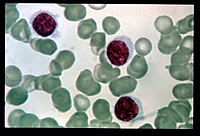
Photo from wikipedia
Majority of chemotherapeutic agents can elicit antitumor immunity and modulate the composition, density, function, and distribution of tumor infiltrating lymphocytes (TILs), to influence differential therapeutic responses and prognosis in cancer… Click to show full abstract
Majority of chemotherapeutic agents can elicit antitumor immunity and modulate the composition, density, function, and distribution of tumor infiltrating lymphocytes (TILs), to influence differential therapeutic responses and prognosis in cancer patients. The clinical success of these agents, particularly anthracyclines like doxorubicin, not only depends on their cytotoxic activity but also by the enhancement of pre‐existing immunity primarily through induction of immunogenic cell death (ICD). However, resistance for the induction of ICD either intrinsic or acquired is a major hurdle for most of these drugs. To enhance ICD by these agents, it has become clear that blockade of adenosine production or its signaling need to be specifically targeted as they represent highly resistant mechanisms. Given the prominent role of adenosine mediated immunosuppression and resistance to ICD induction in tumor microenvironment, combination strategies that involve ICD induction and adenosine signaling blockade are further warranted. In the present study, we investigated the antitumor effect of caffeine and doxorubicin combination therapy against 3‐MCA‐induced and cell‐line induced tumors in mice. Our results demonstrated significant tumor growth inhibition by the combination therapy of doxorubicin and caffeine against both carcinogen‐induced and cell‐line induced tumor models. In addition, significant T‐cell infiltration and enhanced ICD induction evidenced by increased intratumoral calreticulin and HMGB1 levels, was observed in B16F10 melanoma mice. The possible mechanism behind the observed antitumor activity might be due to the enhanced ICD induction and subsequent T‐cell infiltration by the combination therapy. To prevent the development of resistance and to enhance the antitumor activity of ICD inducing drugs like doxorubicin, combination with adenosine‐A2A receptor pathway inhibitors like caffeine might be a potential strategy.
Journal Title: Journal of Biochemical and Molecular Toxicology
Year Published: 2023
Link to full text (if available)
Share on Social Media: Sign Up to like & get
recommendations!